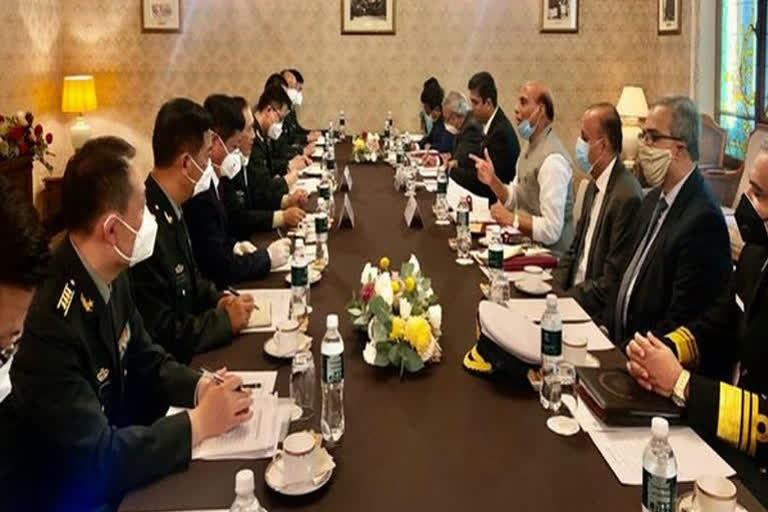New Delhi: India’s participation in the SCO foreign ministers meeting in Russia’s capital Moscow amid the growing tension with China and the COVID-19 pandemic, comes with much hope and expectations.
SCO is known to have provided a common platform for building mutual trust, enhancing cooperation and finding common ground between countries. The meeting holds significance for India’s regional and global interests especially when the country is facing conflict with its neighbouring countries especially with China and Pakistan.
Will India and China use SCO to address their differences?
Speaking to ETV Bharat, Director Security Risks Asia Rahul Bhonsle said, “Beyond providing a venue for bilateral meetings, SCO given its policy of not discussing bilateral issues may not prove of much significance to resolve India China dispute. What happens is thus all the disputes are left out of the agenda”.
"But there are ample opportunities for a bilateral on the sidelines and India and China must seize the opportunity of SCO foreign ministers meet for Jaishankar-Wang Yi to work out a format for disengagement as time is running out and jingoism is building up on both sides," he added.
Previously on Tuesday, Roman Babushkin, Russia’s Deputy Chief of Mission of the Russian embassy in Delhi has said that Russia encourages India and China to resolve the Line of Control row but won’t directly interfere.
He also expressed hope that SCO can provide a platform for building mutual trust between member states and also Russia would encourage an outcome which provides an impetus to talks for de-escalation and disengagement between the two countries.
“SCO members individually can build gentle pressure on India and China to resolve their differences and avoid a flashpoint. This is what the Russian Deputy Chief of Mission Roman Babushkin meant when he said of providing a favourable environment”, Bhonsle points out.
READ: SCO meet: EAM Jaishankar to meet Russian Foreign Minister Sergey Lavrov
Bhonsle said that Russia will definitely attempt to do so along with other SCO members and seek a dialogue between India- China and India-Pakistan. However, a meeting between Jaishankar and Shah Mahmood Qureshi is clearly unlikely in Moscow.
During the last meeting of SCO Defence ministers, India’s Defence Minister Rajnath Singh met his Chinese counterparts to discuss the ongoing border disputes.
Now all eyes are on the meeting between External Affairs Minister S Jaishankar and his Chinese counterpart Wang Yi on the sidelines of the ongoing SCO council of foreign ministers in Moscow, days after a military standoff over border tension in Ladakh. Jaishankar is likely to meet his Chinese counterpart on Thursday.
The bilateral meeting of the Foreign ministers of India and China on the sidelines of the Shanghai Cooperation Organisation (SCO) will be the first face-to-face political contact between India and China since the current stand-off began in early May.
India and Pakistan have recently joined the SCO in 2017 whose original members are China, Russia, Kazakhstan, Kyrgyzstan and Tajikistan, Uzbekistan and among all the countries, India’s entry in SCO was particularly supported by Russia.
“SCO serves India’s multiple interests. It provides a platform for India’s engagement with Eurasia as a whole which is a critical area of Indian interest with a number of vital projects such as the Chabahar Port and the International North-South Transport Corridor which can change the dynamics of India’s diplomatic and trade profile in this region”, Bhonsle said.
He underlined that this apart sustains India’s interests in Afghanistan, Iran and Central Asia and provides a multilateral platform for bilateral engagement. India also acts as a counterweight to China in this organization which had a larger profile so far. Finally, SCO provides India with a platform for promoting reformed multilateralism.
The SCO discussion will lay the ground for the upcoming session of SCO Heads of State Council expected to be held later this year. The foreign ministers at SCO will discuss key international and regional issues in the context of the 75th UN anniversary. The deliberations will be centred around a number of urgent foreign policy issues as well as decisions aimed at further developing SCO activities on overcoming the global political and socio-economic consequences of the COVID-19 pandemic. Russian President Vladimir Putin will address the SCO leaders later on Wednesday.
READ: Rajnath, Chinese counterpart hold talks on easing border tension



